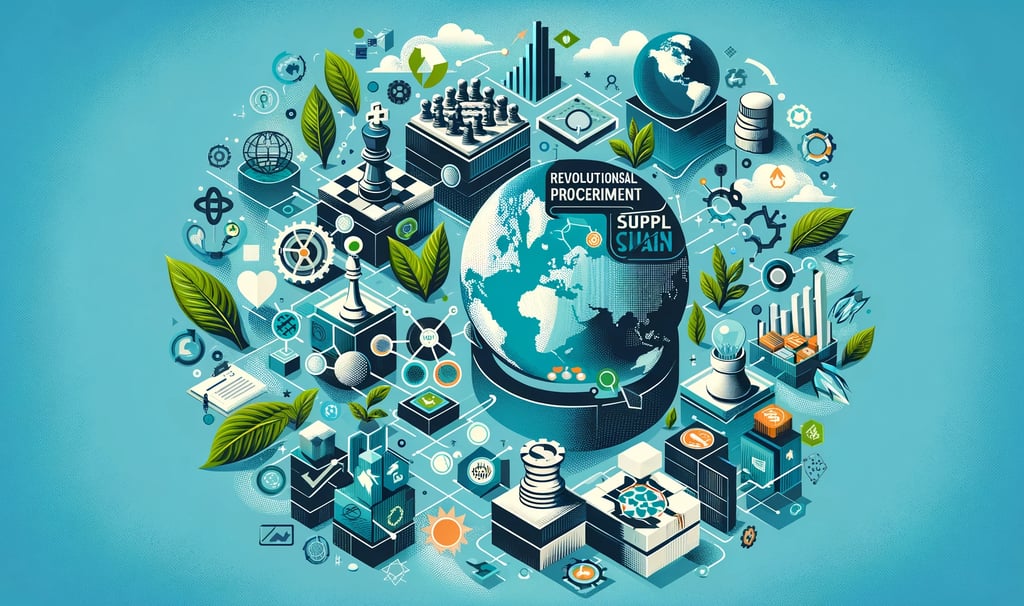Importance of Procurement in Supply Chain.
What is procurement's role in a supply chain? This guide explains the 5 key functions, including cost management, SRM, quality control, risk, and sustainability.
SUPPLY CHAIN
The Procure 4 Marketing Team
12/7/20233 min read


Quick Answer: What is procurement's role in a supply chain?
Procurement is the strategic engine of a supply chain, responsible for sourcing and acquiring all the goods and services a company needs to operate. Its role goes far beyond simple purchasing. The 5 key functions of procurement are: 1) Cost Management, 2) Supplier Relationship Management (SRM), 3) Quality Control, 4) Risk Management, and 5) Promoting Sustainability. A well-run procurement department ensures the supply chain is cost-effective, resilient, and high-quality.
What is Procurement in a Supply Chain?
Procurement is the formal, strategic process of finding, selecting, and acquiring goods, services, or works from an external source. It's crucial to distinguish it from "purchasing":
Purchasing is the transactional act of buying. It involves placing an order, receiving the goods, and paying the invoice.
Procurement is the entire end-to-end process that includes strategic activities before the purchase (like market analysis and supplier vetting) and after the purchase (like performance management and relationship building).
In a supply chain, procurement acts as the critical link between a company's internal needs and its external suppliers, ensuring a smooth and efficient flow of necessary resources.
The 5 Key Functions of Procurement in a Supply Chain
Procurement's strategic importance can be understood through its five primary functions.
1. Cost Management
This is the most direct way procurement impacts a company's profitability. The goal is to reduce the Total Cost of Ownership (TCO), not just the initial price tag.
What they do: Negotiate favorable terms, identify cost-effective solutions, and analyze spending to find savings opportunities.
Real-World Example: Instead of just buying coffee beans at the market price, a procurement team for a large coffee chain negotiates a long-term contract with a supplier for a high volume of beans, locking in a 15% discount.
2. Supplier Relationship Management (SRM)
This function involves building and maintaining strong, collaborative partnerships with key suppliers.
What they do: Monitor supplier performance against KPIs, foster open communication, and work with suppliers on joint innovation and process improvements.
Real-World Example: A car manufacturer holds a quarterly business review with its critical microchip supplier to discuss upcoming demand, share new product roadmaps, and solve potential production challenges together.
3. Quality Control
The quality of the final product is directly dependent on the quality of the inputs. Procurement is responsible for ensuring all sourced materials and services meet the company's standards.
What they do: Set quality specifications for suppliers, conduct supplier audits, and include quality standards directly into contracts.
Real-World Example: A gourmet chocolate company's procurement team specifies in their contract that all cacao beans must be "single-origin" and meet a specific, measurable quality score, rejecting any batches that don't comply.
4. Risk Management
Modern supply chains are vulnerable to disruption. Procurement acts as the first line of defense, identifying and mitigating potential risks.
What they do: Assess supplier financial stability, monitor geopolitical risks, and develop contingency plans. A key strategy is supplier diversification.
Real-World Example: To avoid a shutdown, a smartphone company's procurement team decides to source a critical screen component from two different suppliers in two different countries. If a natural disaster strikes one region, they can rely on the other.
5. Promoting Sustainability & Ethics
Procurement has the power to drive a company's social and environmental goals by holding the supply chain accountable.
What they do: Vet suppliers for their environmental practices and fair labor standards, prioritize sourcing from sustainable sources, and ensure compliance with anti-corruption laws.
Real-World Example: A clothing brand's procurement team requires all its fabric suppliers to provide certifications proving they use organic, pesticide-free cotton and adhere to fair labor practices in their factories.
Frequently Asked Questions (FAQ)
Q1: What's the difference between procurement and supply chain management?
Procurement is one of the key functions within Supply Chain Management (SCM). SCM is the broader field that covers the entire end-to-end management of the flow of goods, which includes procurement, as well as logistics, manufacturing, and inventory management.
Q2: What is the "procurement cycle"?
The procurement cycle (or procure-to-pay cycle) is the specific sequence of steps for a purchase. It typically includes identifying a need, creating a purchase requisition, issuing a purchase order (PO), receiving the goods, processing the invoice, and making the payment.
Q3: What is "strategic sourcing"?
Strategic sourcing is an analytical, long-term approach to procurement. Instead of just buying goods as needed, it involves a deep analysis of a company's spending, the supplier market, and the total cost of ownership to make the most optimal sourcing decisions that align with business goals.

